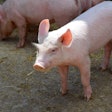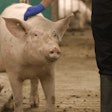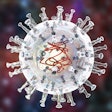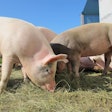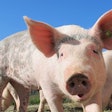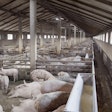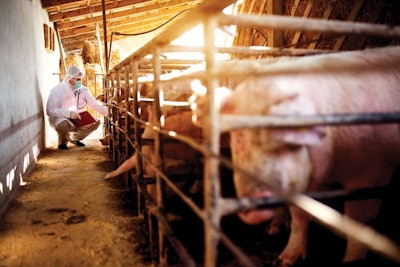
A previously suspected African swine fever (ASF) outbreak at a farm in central Taiwan has been confirmed.
More than 100 of the 301 animals died at the premises in the Taichung city area one week ago, according to the official notification to the World Organisation for Animal Health (WOAH). The source of the infection was stated as uncertain.
This is the first ASF outbreak in Taiwan, and it brings to 21 the number of Asian nations hit by the disease since August 2018, according to the latest update on the disease situation in the region from the the United Nation’s Food and Agriculture Organization.
Latest on the ASF situation in Taiwan
When ASF was first suspected, the authorities in Taiwan announced a series of measures aimed to bring the disease under control.
Among these was a 15-day ban on the feeding of kitchen waste to swine, reported the Central News Agency (CNA). Disposal of food waste during this period must be at designated disposal sites, and anyone found to be violating this rule will be subject to a fine of up to TWD3 million (US$98,000).
An initial five-day ban on the movement of pigs anywhere in Taiwan has now been extended for a further 10 days, reported Focus Taiwan.
Meanwhile, officials will inspect the cooking equipment at the 435 farms licensed to feed food waste to swine. Inspections are also being stepped up at Taiwan’s border points such as ports and airports to prevent the entry of potentially infected pig products.
Representatives from Taiwan’s pig sector are supporting the strict measures imposed on the movement of pigs and feeding restrictions. However, one association president called on the government to support the pork chain to maintain market stability once the measures are lifted.
As yet, there has been no confirmation of the source of the ASF virus in Taiwan. CNA reported that the deputy agriculture minister would not be drawn on media speculation that the virus isolated from the outbreak contained fragments from a Vietnamese ASF virus.
Latest report from Focus Taiwan (dated October 27) indicates that the ASF outbreak has been contained at the Taichung farm.
According to this source, there may have been some delay in diagnosing the cause of the pigs’ illness as they did not exhibit typical symptoms of ASF. Furthermore, the report alleges some records on pig feed processing from the farm were not submitted.
ASF developments elsewhere in Asia
There are active ASF cases in seven regions of the Philippines, according to the latest update on the disease situation from the Department of Agriculture’s Bureau of Animal Industry (dated October 17).
Cases of ASF are ongoing in two more regions than two weeks previously. Added to the “active” list are the Luzon island regions of Cagayan Valley and Calabarzon, as well as the Bangsamoro region of Mindanao. It appears that the disease has been brought under control in the Eastern Visayas region.
Last week, the first wild boar in South Korea tested positive for the ASF virus for three months. It was found in the northeastern province of Gangwon, reported local media Pig People.
Latest European ASF outbreaks include Romanian farm
Over the past week, veterinary authorities of five states in Europe have reported new outbreaks of ASF in their respective domestic swine populations.
A total of 18 new outbreaks were logged in this period — 10 by Romania, five by Serbia, two by Croatia and one by Bosnia-Herzegovina.
This is according to the latest update of the Animal Disease Information System by the European Commission (EC; dated October 22). This database is used to monitors outbreaks of listed animal diseases in European Union member states and selected adjacent countries.
These developments bring the outbreak total in this population in the year to date to 817, according to this source. Cases have been logged by 13 states in the region.
Highest totals so far in 2025 are 407 for Romania, 205 in Serbia and 52 in Croatia.
For comparison, a total of 764 outbreaks in this category were reported by 16 states through the EC system during 2024.
More detail on these developments is covered in official notifications from the national animal health agencies to WOAH.
In Romania, only one of the eight outbreaks in this category registered with WOAH involved a commercial herd. Located in the northwestern county of Satu Mare, it comprised more than 4,600 pigs, 26 of which died.
The other recent outbreaks in Romania, Bosnia-Herzegovina and Serbia all involved small backyard swine herds.
Additionally, ASF virus has been detected at a farm in Chernivtsi in western Ukraine. Of the 300 pigs at the premises, 220 died. It was the first outbreak in this province since March.
Cases in European wild boar pass 8,700
As of October 22, the number of outbreaks involving Europe’s wild boar stood at 8,718, according to the EC system. There have been cases in 18 states in the region.
In 2024, 21 countries logged a total of 7,892 ASF outbreaks in this population with the System.
Over the previous week, Poland, Croatia and Latvia recorded the most additional cases in wild boar at 42, 40 and 38, respectively. Small numbers of further outbreaks were registered by Estonia, Germany, Hungary, Italy, Lithuania, Romania and Slovakia.
So far this year, the highest total — 2,890 — has been reached by Poland. Next come Germany (1,860), Latvia (992), Hungary (705), Lithuania (589) and Italy (557).
Over the past week, WOAH has additionally been notified on three new cases among Ukraine’s wild boar, and one in Serbia.
Further ASF outbreaks in South Africa
Four more ASF outbreaks involving domestic swine have been reported to WOAH by the South African animal health agency over the past few days.
Directly impacted were a herd of 100 animals in Eastern Cape, a small farm in North West, and two village herds — one in Gauteng, and one in Western Cape.
View our continuing coverage of the global African swine fever situation.












